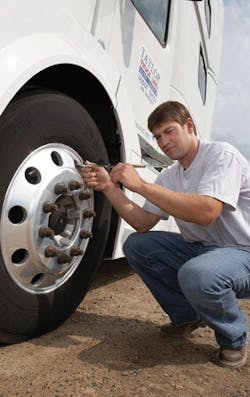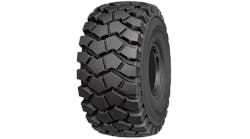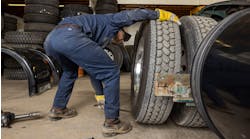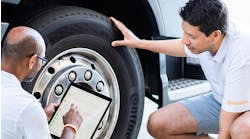This article by commercial tire sales expert Jason Miller is the first installment in a new, multi-part series about successful commercial truck tire selling. In this installment, Miller tells you how you can secure your link in the value chain. His book, “Selling by the Numbers,” is available from Amazon.com and other on-line booksellers. For more information about Miller and his company, TheTireConsultants, visit www.thetireconsultants.com.
During a recent trip to Asia, I exchanged some of my American dollars for another country’s currency and wound up bringing a little over 10,000 units of that currency home with me. What do you suppose it was worth?
On the way home from the airport, my wife and I stopped for breakfast. When it was time to pay the bill, I pulled out the foreign money and jokingly asked if the restaurant accepted it. The cashier was not amused. To him, the currency was worth zero.
To our waiter, however, it was a different story. He asked me if he could have the money as his tip! He thought it would be a cool gift to bring home to his son. It was clearly worth more to him than whatever tip I was going to leave.
What was the money worth to me? I could have driven to a currency exchange, paid a service charge and converted it back to U.S. dollars. Or I could help a young man bring a smile to his son’s face while telling a story about this nice man he met at work who just returned from a grand adventure.
I tipped the waiter in U.S. dollars, too. But brightening his day and his son’s day was worth more to me. Everybody has a different idea of what they consider something to be worth. That’s why a one-size-fits-all selling style does not work.
No two customers are the same. They may have different operational challenges, corporate structures, customers, equipment and more. And each buyer has a different personality. What one considers a benefit may be of little use to another.
Identify what’s important
Many years ago, I built a tire maintenance program for a large trucking fleet. Together we figured out how to drive every imaginable cost out of their tire expense. Our personalities could not have been a better fit.
I was convinced the same program would be equally valuable to another similar sized fleet. I secured an appointment with another trucking company and formally presented my comprehensive, highly polished program.
While they were impressed, there was one fatal flaw. This fleet was one of the last fleets of its size in the country that actually ran its own tire program!
They hauled their own tires back and forth to a single shop, where they had a retread plant and a staff of workers. In addition, I was presenting to the person who managed their in-house tire program. If I succeeded, he would be out of a job. He didn’t see much benefit in trying my program.
As a professional salesperson, you are the final link in the value chain. You must identify what’s important to each of your prospects. You must then find a combination of products and services that will meet those demands at the lowest cost.
Countless people were involved behind the scenes in making those products and services available to you (see sidebar on page 40). It’s your job to bring it home.
More valuable than ever
There are two types of salespeople. The first are order takers. Order takers are not highly compensated because they only communicate the value that others create. The second type are called sales consultants. They’re not only compensated for connecting value to the end user; they earn more because they create additional value.
Do you add value to every transaction? Whether you’re providing more benefits for the same price or the same benefits for a lower price, you are increasing value.
Unfortunately, far too many salespeople try to improve value by dropping the price. It’s easy; when a customer can get the same quality at a lower price, they get more value for their money.
But if you expect to be highly compensated, you must do more. You must create value by increasing the benefits and not by lowering the price. Here are some benefits for which many fleet customers are willing to pay extra:
• Professional recommendations based on scientific inspection of an operation.
• Someone who returns calls quickly and follows up promptly.
• Creative solutions to fleet operating challenges.
• Knowledge of state-of-the-art products and methods for improving tire programs.
• Streamlined billing procedures.
• Reduction in down time.
• Scrap tire inspection to identify wasted dollars.
Buyers will pay for these value-added services because these services provide a high return on investment.
Professional tire consultants are valuable in tough times! When the economy was overheated, many of us were busy just trying to find tires.
We knew we should have been building our customer base, but who had time for that when customers were screaming for product?
In tough economic times like these, customers demand value. There’s no room for error or waste. Right now you not only have an opportunity but a responsibility to improve the total value proposition.
As you create additional value for your customers, you enable them to create additional value for their customers.
In order to do this, you must get to know your customers on a personal level and make a commitment to help them build a program that fits their unique needs.
When the cycle turns back around, your efforts will be richly rewarded. ■
'Paying it forward' -- A lot of people depend on you to make the sale
If you ever come home after a hard day at work and ask “What’s the point?” don’t forget that you, as a salesperson, are a critical link in the value chain.
Thousands of people are depending upon you to connect the product they have created to the end user.
They include the farmer who harvests natural rubber. Somewhere in Asia, a farmer planted some rubber trees. He cared for these trees for five to seven years. He then tapped them for the latex used in rubber production. Using a very time-consuming process, he harvested the latex and dried it, producing rubber. Until you make a sale, there’s no need for this valuable work.
That rubber is then shipped to a factory by a steamship that took it from Port A to Port B. It was then picked up by a truck or a rail car. This same process is repeated for steel, carbon black and a host of other components. Meanwhile, a cadre of engineers has worked very hard to figure out the best possible combination of these materials. If you don’t make the sale, all of this activity is of no value.
The value chain continues in your hometown, where someone has invested the time, money and energy to open a tire store. A freight company ships the product to the store, where it sits on the shelf. However, tires are of no value until they are sold and installed on a truck. That’s where you come in.
All of the previously mentioned people “paid it forward” and are now waiting for you to make that sale. Think about all of those people. Each of them is able to provide some kind of life for themselves and their families every time you complete the value chain. — Jason Miller
In the April 2009 edition of CTD, Miller asks, “Do all negotiations have to end in a win-win?”




